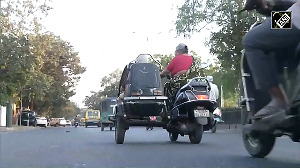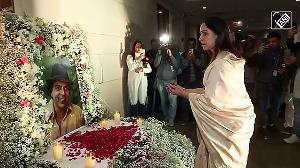'Police records suggest one Kashmiri boy joined terrorist ranks every third day last year and that trend has continued,' says Karan Thapar.

Perhaps because we are inured to bad news from Kashmir, many people don't realise how sharply the situation has deteriorated since 2014.
Yet the facts have been reported by a variety of papers on a pretty regular basis.
It's just that we've either ignored them or haven't properly understood them.
So let's start with the facts.
The ones I'm about to refer to have been collated from a wide selection of newspapers as well as from well-informed research Web sites like the South Asia Terrorism Portal.
On occasion, I will even quote the state government and the police.
Between 2015 and 2017 terrorist incidents have increased by over 160 per cent, rising from 208 in 2015 to 322 in 2016 and 342 in 2017.
Although during this period the number of terrorists killed has more than doubled so too has the combined civilian and security personnel death count.
The latter has risen from 56 in 2015 to 120 in 2017.
Meanwhile, any claim that demonetisation has reduced the incidence of terror has proven false.
Between November 1, 2016, and October 31, 2017, there were 341 terror incidents compared to 311 during the corresponding period a year earlier.
The emerging picture is simple, but stark.
We may be killing more terrorists but we are doing so at double the cost whilst the number of terrorist incidents keeps significantly increasing.
This, no doubt, is why the sharp decline in stone pelting incidents has made little impact.
Particularly worrying is the rising number of young Kashmiris joining the various terror groups.
The state government claims that 280 have joined in the last three years, 66 in 2015, 88 in 2016 and 126 in 2017.
Police records suggest one Kashmiri boy joined terrorist ranks every third day last year and that trend has continued.
Twenty seven more joined terrorist groups in the first three months of this year.
Some reports suggest that the Jaish-e-Mohammed is the biggest gainer.
More than 70 Jaish terrorists are said to be active in Kashmir.
Meanwhile, the overall number of active insurgents seems to have shot up from 80 in 2014, to over 250, which is a three-fold increase.
The situation on the border shows the same marked deterioration.
In 2017, ceasefire violations increased 317 per cent compared to 2016, to touch 860 altogether. So far this year there have been 400 more.
Simultaneously, infiltration from across the border is also rising markedly.
There were 223 reported cases in 2015, 454 in 2016 and 515 in 2017.
This means between 2015 and 2017, the figure has jumped almost 130 per cent.
I am not sure what set of adjectives best describe the statistics I have related, but speaking for myself I find them shocking.
I was aware the situation in Kashmir was distressing and deteriorating, but I had not appreciated the cumulative nature of the problem or the scale of the deterioration.
It has left me shaken.
Clearly, the government's strategy for handling Kashmir is not working.
The so-called tough response to insurgency and terror alongside the refusal to talk to the Hurriyat has only increased the number of terrorist incidents, the death count and the recruitment of local boys to terrorist groups.
The last is particularly perturbing.
It suggests the alienation of our own citizens is now fuelling the violence.
Meanwhile, on the international border and Line of Control, ceasefire violations are increasing as is infiltration and the cost is being paid by innocent villagers whose homes and lives have been devastated.
How long can this continue?
How long can the government believe more of the same can yield a different result?
And, finally, does the refusal to change course suggest that because the price is paid by Kashmiris the rest of us don't really care?
I admire strong leadership and determined government, but this appears to be a case of obstinacy if not also indifference.
It seems the Modi government isn't all that worried about what happens in Kashmir.
And though Mehbooba Mufti has publicly and repeatedly voiced her fears, her pleas have gone unheeded if not unheard.
The Kashmiris may be crying, but I fear their tears are falling in vain.











